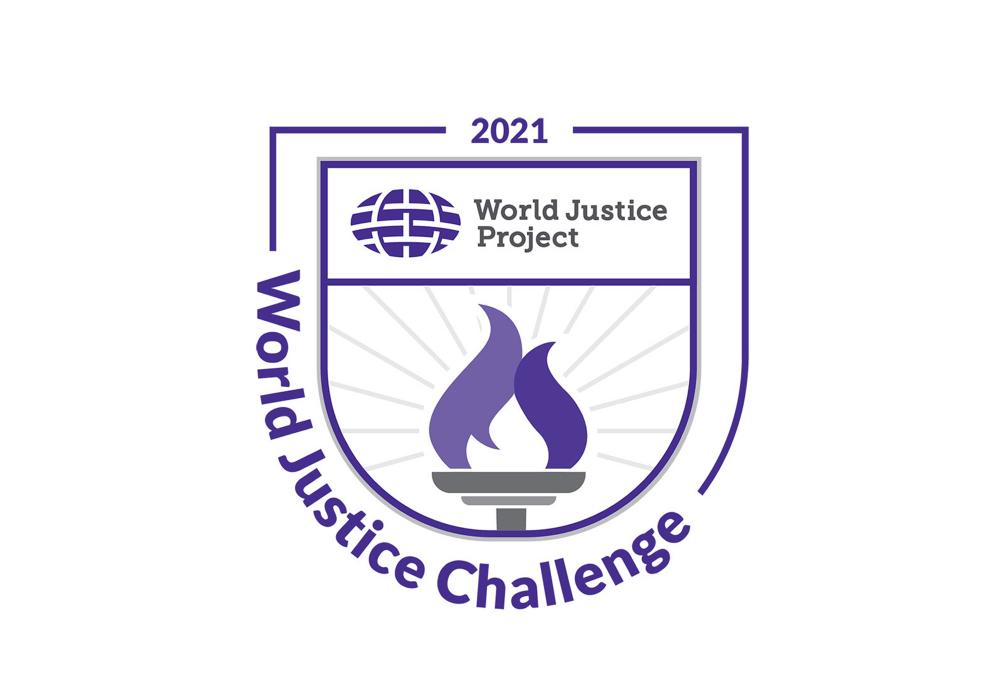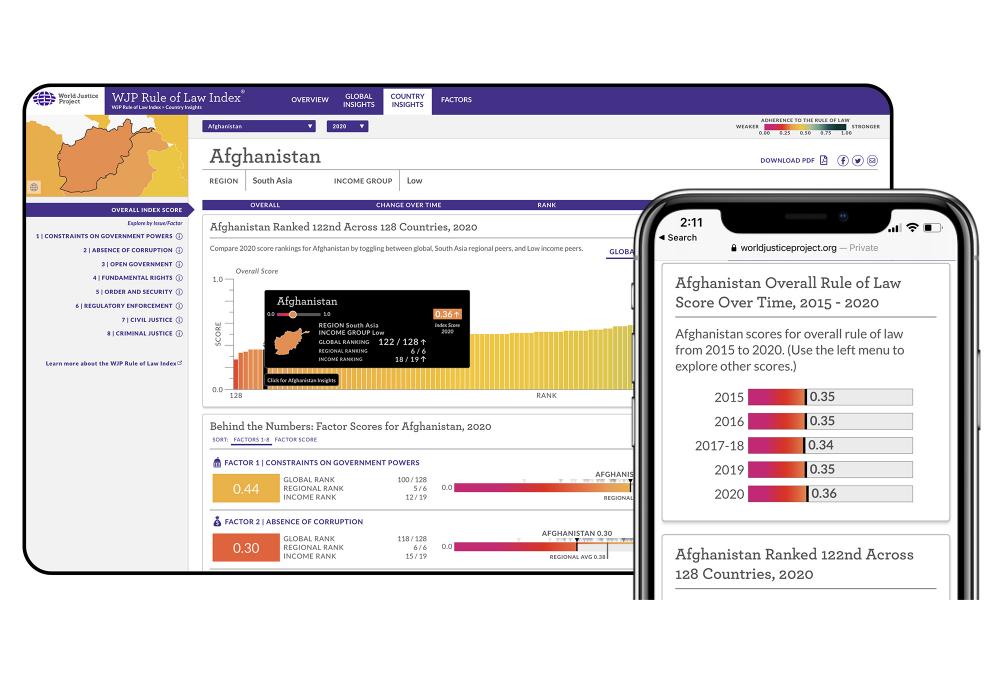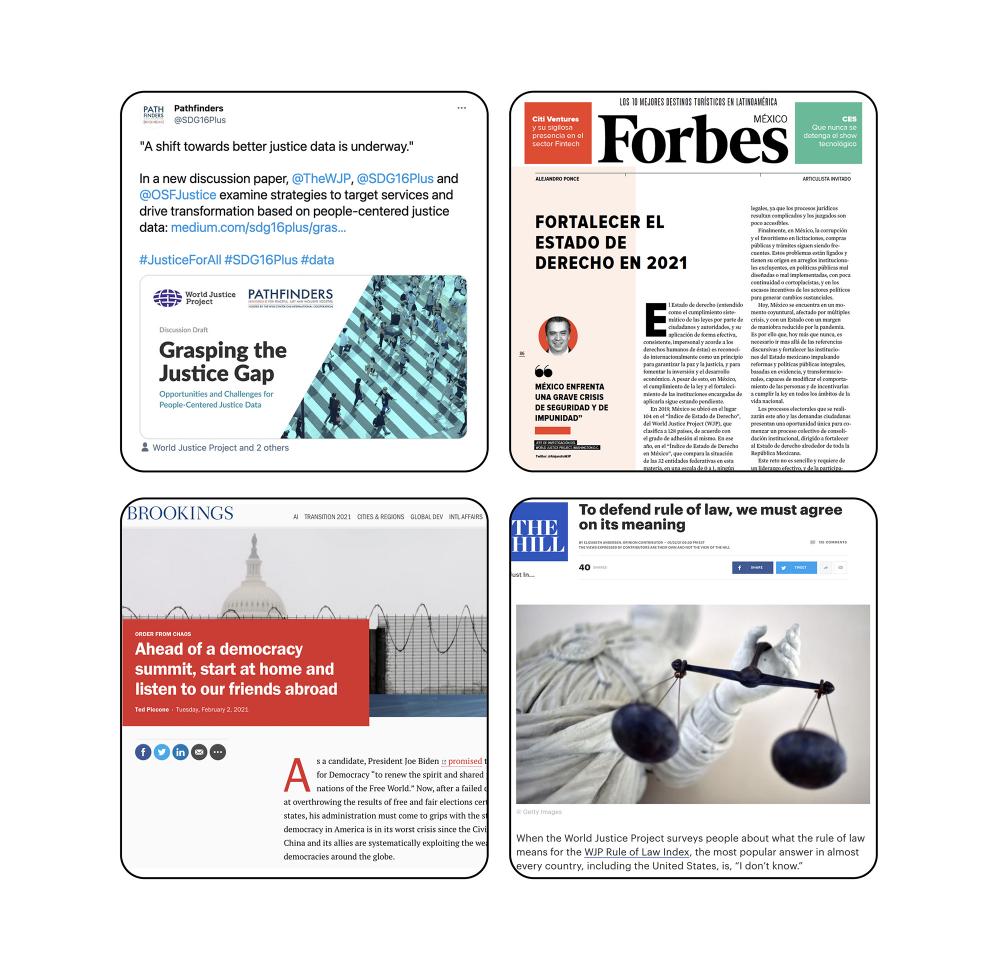

World Justice Challenge 2021 finalist projects, from top left (clockwise): "Increasing A2J Through Online Learning and Virtual Courts" (Kenya/Uganda/Gambia/Regional), "Improving Maya Women's Access to Justice" (Guatemala), "Making Justice: Judiciary Response for COVID-19" (Brazil), "Supporting Survivors: Women's Rights" (Iraq), "Combating Gender Discrimination in the Criminal Justice System" (Afghanistan), and "Civic Digital Participation in Legislation During COVID-19" (Latvia).
Building Back Better
The World Justice Challenge 2021—WJP's global competition to identify, recognize, and promote good practices and high-impact projects that advance the rule of law—is now in the final stages, with 30 finalists competing for top $20,000 USD prizes. Among the five awards selected by a committee of experienced judges, WJP's new Ruth Bader Ginsburg Legacy Prize will go to the Challenge finalist project that best exemplifies the fight against inequality and gender-based discrimination. One additional winner will be selected by popular vote by WJP's network for its inspiration and impact. Voting will open on Thursday, April 15. Request your ballot.

As part of the Challenge, a series of finalist regional showcases is underway, featuring discussions of unique regional challenges and highlighting projects' demonstrated impact in advancing the rule of law in areas affected by the COVID-19 pandemic. Join us for the final showcase on April 14, focused on Europe, North America, and Central Asia.
WJP Data Adopted in New Afghanistan State-Building Framework
The government of Afghanistan has become the latest of a number of countries officially using WJP’s survey-based data in their development targets. The WJP Rule of Law Index will be used as an official measure of progress under the Afghanistan Partnership Framework, an agreement reached with the international donor community at the 2020 Afghanistan Conference in late November. The framework recognizes "improved rule of law performance as measured by the WJP Rule of Law Index" as an indicator of progress toward "effective, accountable, and self-reliant state institutions."

Framing the Rule of Law Conversation
- As COVID-19 continues to pressure health systems and governments, justice leaders are prioritizing people-centered data to inform smart policy. In a new discussion paper, "Grasping the Justice Gap," WJP and co-authors Pathfinders for Peaceful, Just and Inclusive Societies and the Open Society Justice Initiative identify strategies for data-driven transformation.
- In an opinion piece for Forbes Mexico, WJP Chief Research Officer Alejandro Ponce discusses the state of the rule of law in Mexico as revealed by WJP data—and what it will take to improve it in the coming years.
- Ted Piccone, WJP Chief Engagement Officer, provides perspective on the Biden administration's planned Democracy Summit for the Brookings Institution, suggesting steps to shore up fractured politics in the US while inspiring greater confidence and cooperation among other democracies around the world.
- When WJP surveys people about what the rule of law means to them, the most popular answer is, "I don’t know." In a recent op-ed for The Hill, WJP Executive Director Elizabeth Andersen discussed the importance of a shared understanding of the rule of law in order to uphold its ideal

Mexico's Missing Police Reform
In Mexico, criminal investigations are rare. Out of an estimated 33 million crimes in 2018, public prosecutors opened just 2.2 million investigations. As shown in this video produced by the research team at WJP-Mexico, the cause of this issue can be traced to the responsibilities given to—and withheld from—the police.
Data Drives Justice—and the News
Recent WJP media mentions from around the world:
Colombia’s Open-Door Policy for Venezuelan Refugees
Borgen Magazine | March 29, 2021
What’s in Kazakhstan’s 2025 Development Plan?
The Diplomat | March 23, 2021
‘Jaat ko Prashna’ Selected Among the 30 Finalists for World Justice Challenge
The Kathmandu Post | March 9, 2021
Marathon Hong Kong Security Law Hearing Slammed as ‘Farce’
Bloomberg News | March 3, 2021
Covid-19 Exacerbates Women’s Inequal Access to Justice System
The Standard | February 28, 2021
When a State Suffers from an Image Crisis
The Business Standard | February 28, 2021
5 Ways Duterte Has Become a Threat to Philippine Democracy
Rappler | February 24, 2021
Pakistan and the Rule of Law Index 2020
The Express Tribune | February 14, 2021
Latin America Faces Environmental Gaps Awaiting Escazú Agreement
El Desconcierto | February 6, 2021
What is the Law For?
El Universal | January 27, 2021
10 Years after the Arab Spring: Can Democracy be Exported?
Brussels Morning | January 26, 2021
Latin America “Halfway” Towards Good Environmental Governance
Diálogo Chino | January 19, 2021
WJP’s Impact Update newsletter is a new quarterly roundup of WJP's work and influence in the rule of law community and beyond. Sign up for WJP's e-newsletter to receive future updates!






